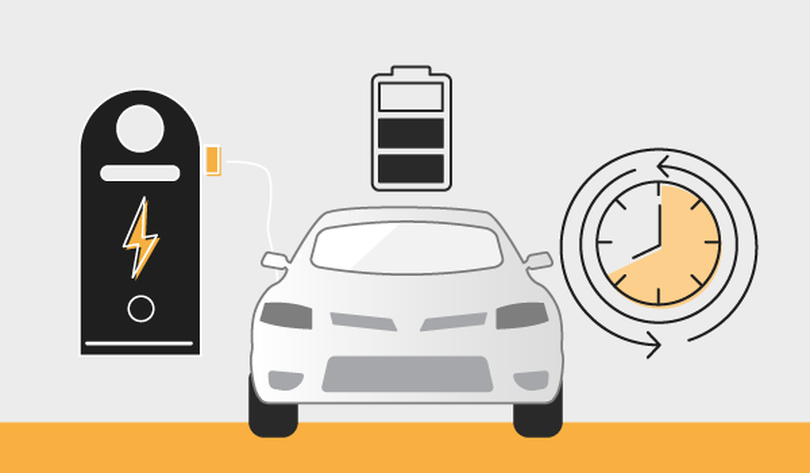Figuring out how long it takes to charge an electric vehicle is a crucial factor to ponder when deciding on the right electric car for you and determining your primary charging method.
The rate at which an electric car can be charged is influenced by several factors, such as the car’s efficiency, the type of EV charger in use, and, if you’re curious about the time for a full charge, the battery capacity.
This comprehensive guide covers all aspects of electric vehicle charging, ranging from the duration required to charge an EV to various charger types and the factors influencing charging speed.

How to work out how long it takes to charge an electric car
To determine the time needed for a specific EV to reach a full charge, examine its battery size in kilowatt-hours (kWh) and divide this by the charger’s power output.
Charging Time (in hours) = Battery Size (kWh) ÷ Charging Power (kW)
So, if we consider the average 40kWh car using a standard 7kW home charger, the estimated time for a full charge would be 5 hours and 42 minutes.
In practical terms, charging from 0% to 100% is uncommon. Manufacturers advise against charging beyond 80% of the full battery capacity or letting it drop below 20% (as it typically doesn’t arrive completely empty).
To calculate the time required to recharge your car to a specific percentage, multiply the percentage by the battery size to determine the added energy, and then divide this by the charger’s power.
Charging Time (in hours) = Energy Added (kWh) ÷ Charging Power (kW)
So to charge the average 40kw electric car from 20% to 80%, would take 3 hours and 26 minutes – if using a 7KW charger.
Different types of chargers and their charging speeds
The charging speed of an electric car or van is contingent on the charging method employed. A higher-powered charger tends to facilitate a faster charging process.
- Domestic socket (2.4kW): Slowest method, takes 10 hours to charge average car to 80%. Not recommended for fire safety reasons.
- 7kW Fast Charger: Popular for home and workplace charging, takes 3 hours and 26 minutes for an average car.
- 22kW Rapid Charger: Found at service stations and public places, takes 1 hour and 5 minutes for the average 40kWh electric car.
- Rapid Charging Point (50kW): Located at motorway service stations, provides faster charging times, taking 29 minutes for the average 40kWh car.
- Ultra-Rapid Charging Point (100kW to 150kW): Fastest method, top-up charges as quick as 10 minutes for certain models. Takes 9 – 14 minutes to charge the average 40kWh car using this method.
Want to install a home charger?
Efficiency and Battery Size
Above we provided charging times based on an average 40 kWh car, however, in reality, the battery size of electric cars can vary from as little as 15 kWh to over 100 kWh. Larger batteries tend to provide a larger driving range, but will take more time to fully charge. Smaller batteries will take less time to charge in full but may have a much shorter range.
Charging Duration for Different Electric Car Batteries (20% to 80%)
| Car Model | Real Range | 2.4kW | 7kW | 50kW | 100 kW |
|---|---|---|---|---|---|
| Mini Electric (28.9 kWh battery) | 115 mi | 7 hrs | 2 hrs 30 mins | 21 mins | Not compatible |
| Nissan Leaf (37 kWh battery) | 140 mi | 9 hrs | 3 hrs | 27 mins | Not compatible |
| Tesla Model 3 (57.5 kWh battery) | 235 mi | 14 hrs 30 mins | 5 hrs | 41 mins | 14 mins |
Similar to traditional petrol and diesel vehicles, the efficiency of an electric car is determined by its energy consumption per distance traveled. A compact and energy-efficient electric car can cover more miles per kilowatt-hour, the unit used to measure energy, resulting in a shorter charging time per mile compared to a larger, more energy-demanding counterpart.
In addition to knowing the time required for a full charge, it is essential to consider the duration needed to attain sufficient power for a specific journey from point A to point B.
For the average driver in the UK, most journeys are typically under 10 miles. Therefore, it is practical to examine the charging time needed to achieve a 30-mile range, allowing for a comfortable buffer in the battery for a round trip.
Electric Car Charging Times for a 30-mile Range
| Car | Efficiency (wh/mi) | 7 kW Charging Time | 50 kW Charging Time |
|---|---|---|---|
| Mini Electric | 245 | 1 hr 4 mins | 9 mins |
| Nissan LEAF | 332 | 1 hr 25 mins | 12 mins |
| Tesla Model 3 | 232 | 59 mins | 8 mins |
Top-Up Charging for Electric Cars
As the number of electric cars on the roads grow, more charging points are appearing in supermarkets and public spaces across the UK. Utilizing these charging points for top-up charges while parked can supplement overnight charging. Many workplaces now offer EV charging points, providing an opportunity to keep your battery topped up during work hours. If your workplace lacks an EV charging point, Pro EV can assist in installing commercial charging points.
Why Electric Cars Can’t Charge Faster
Currently, it takes significantly longer to charge an electric car’s battery compared to filling up a petrol or diesel car with fuel. However, the technology is continually improving. Ultra-rapid charging points are already available for certain EV models, such as the Tesla Model 3, with charging times ranging from 10 to 20 minutes. In the future, charging speeds could see further improvements.
Factors Impacting Charging Speed
- Battery Capacity: The size of your EV’s battery (measured in kWh) impacts its charging speed.
- Remaining Charge: The amount of charge left on an EV battery also affects charging time.
- Type of Charger: Charging speed depends on the type of charger used, such as home 7kW chargers versus ultra-rapid 100 kW charging stations.
- Charging Rate of Vehicle: Each EV has a different maximum charging rate specified by the manufacturer.
- Colder Temperatures: EV batteries take longer to charge in colder temperatures, affecting efficiency and potentially increasing charging costs.
Top Tips for Electric Car Charging
- Battery Life: Optimize your EV’s battery life by not letting it fall below 20% and charging it up to 80%.
- Top-Up Charging: Charge your EV whenever you park next to a charging point, whether at the supermarket or work. Short bursts of charge also optimize battery life.
